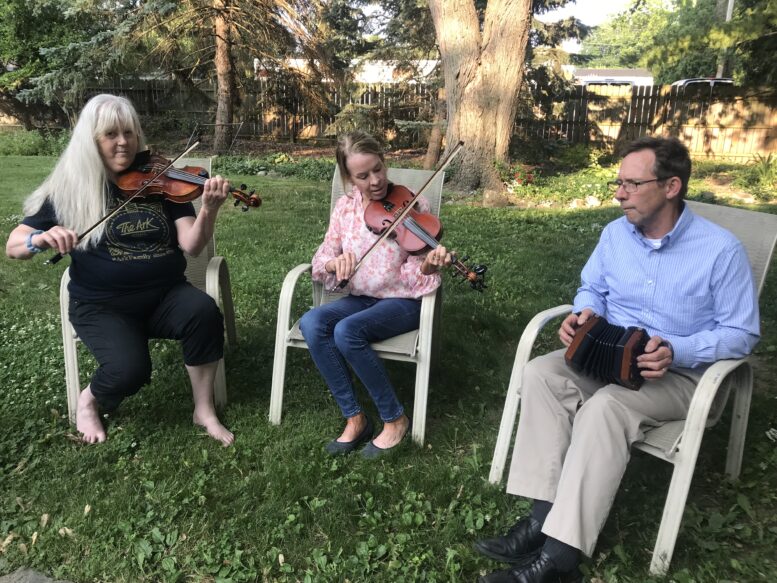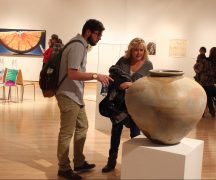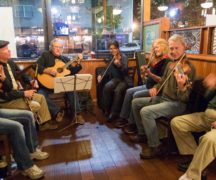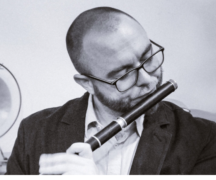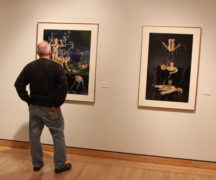By DAVID DUPONT
BG Independent News
School has been in seisiún for the past year for two aspiring Irish music players and their teacher.
Using an artist apprenticeship grant from the Ohio Arts Council, Mary Dennis, fiddler with the band Toraigh, has been working with fellow fiddler Joanie Baas and concertina player Tom Troy to help them become capable to fit into an Irish music seisiún.
Traditional Irish music is social, Dennis said, and being able to play with others at these musical gatherings is essential.
“This music is music that’s played together in the community,” she said. “It is a social event, so I wanted to create a space for that for my students in a way that was comfortable for them, not lickety-split tempos that they couldn’t keep up with.”
So, she founded the loose group Ceoltóirí Nua, literally New Musicians, which holds sessions at her house or in a neighbors’ garage as well as Friday events twice a month at the Blarney in Toledo and monthly at Aistear Brewing in Bowling Green.
The grant is intended to take Troy and Baas to the next level, to play in regular seisiúns.
The purpose of the grant is for a master artist to work with apprenticeships. Dennis, though she’s been performing for 30 years, is reluctant to call herself a “master.”
The goal was for them to develop a repertoire of traditional tunes “that will allow them to play any seisiún at a moderately advance level, so they could go to a session anywhere in the world and feel like they could fit in.”
That includes developing a sense of seisiún etiquette. Seisiún is like a conversation with its own unspoken rules, Dennis said. One doesn’t barge in. Rather a musician will show up with their instrument in its case. “People playing will notice and if they want you to play, they invite you, and if it’s a closed seisiún, they will ignore you.”
Maybe, she added, the visiting musician could ask if they may join in. “It’s just being considerate,” she said.
Baas and Dennis had traveled together to Ireland before the grant. Baas, who took fiddle lessons from Dennis, was able to join in on one tune.
They were expected to learn tunes by ear. The grant paid for recording equipment to allow them to record music they heard at sessions. That’s how the music is learned.
Dennis said they each learned 29 tunes by ear.
“It is a good exercise and strengthens your understanding of the music when you learn it by ear,” Troy said.
New technology does help. There’s a YouTube site that allows a player to slow the music down, without changing the pitch, and to loop a phrase over and over.
Troy said that it gets easier with each tune they learn. He estimates he knows about 100 tunes.
Troy plays guitar and concertina with the band Extra Stout. They play a more popular vocal style of Irish music, with some rock and country tunes mixed in.
He started playing concertina to add to a few tunes with Extra Stout, and since has bought a new concertina allows him the greater facility needed for traditional instrumental music.
Baas’ interest in traditional Irish music started when her daughters were taking Irish dance lessons. A group of mothers formed their own dance group. That’s where Baas met Dennis, whose niece was a dancer. Later Baas decided she wanted to learn to play fiddle as something to do when her children left the house. Two of her children played violin in school. They left behind the violin.
“I knew when the kids left, I would have to pick up a hobby so I wouldn’t get depressed.” So, she retrieved a violin left in the house and took lessons with Dennis.
Dennis also started playing as an adult. She was 30 when she saw a fiddle for sale and decided to buy it. She started playing the popular Irish songs such as “Danny Boy” that her father, Bud Dennis, liked to sing. Her brothers, Tim and Pat, decided they wanted to join her. Tim was learning flute and Pat was on guitar. Then Bob Midden joined on bass and a second flute, and Paddy’s Night Out was formed. The band played its first gig on St. Patrick’s Day 1993 upstairs at Easy Street, and later played at the inaugural Black Swamp Arts Festival.
They played a more popular, pub style or music. They had a singer and an accordionist. As other players moved on Midden and Dennis decided to form a more traditional instrumental band, Toraigh, which has become a mainstay of the area musical scene.
Now with the goals of the apprenticeship met, Baas and Troy are ready to move deeper into the music. Troy even led a seisiún at a festival in Pittsburgh he was attending. “I was a newbie, but I knew enough about it to have some confidence to play the tunes and have other play along.”

